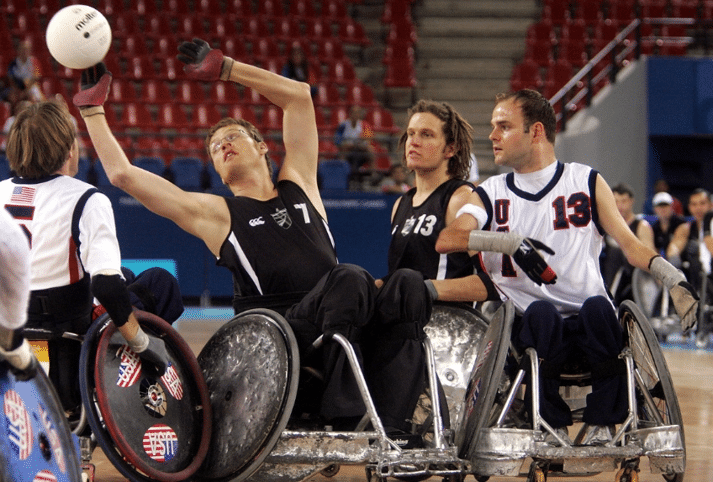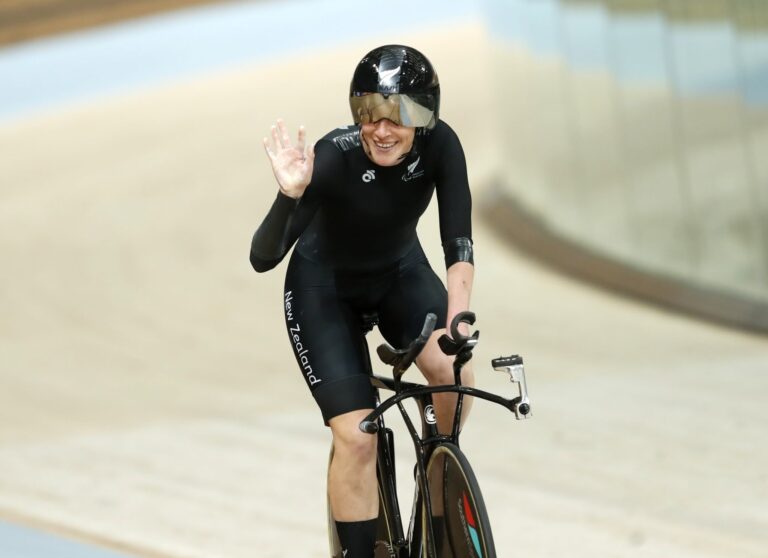Tim Johnson’s life changed forever the day after his 19th birthday. Here, New Zealand’s 126th Paralympian and Wheelchair rugby legend tells James Borrowdale how that accident changed the narrative of his story.
It’s something of a New Zealand rite of passage – cycling home from rugby practice on a frigidly cold night, visible breath looping about you like a mane, a brother pedalling beside you. Wheel Blacks legend Tim Johnson remembers his own childhood bike rides through suburban Christchurch well. “It was a long way… Dad got us into rugby, and he really wanted us to play.“
Those early forays into rugby with the Albion club – he was once selected for the Canterbury under-12 representative team – were intermixed with the varied sporting enthusiasms of many a Kiwi kid: tennis, cricket, volleyball. Johnson says he “just loved the competition and physicality of sport“, and that love has been a constant companion since.
His life changed forever the day after his 19th birthday. He had tagged along with his brother and a few of his mates on a work trip around the countryside west of Christchurch. He was in the back of a work van, sitting on a paint can, when the driver lost control. “I did everything wrong,“ he says. “No seatbelt because it was a workman’s van with no seats. I got dragged out. Driver had been drinking, probably speeding. Anything you could’ve done wrong.“
Everyone else in the van was fine – even the three dogs escaped with hardly a scratch. “And I broke my neck.“ The accident left him a tetraplegic.
But that life-altering moment, he says, didn’t actually alter his life that much – it just changed outward-facing facts of it. Now 43, he says he’d tell a younger version of himself that, despite the hardships that day put in his way, life has worked out much as he planned it would. “Hopefully that 15-year-old would come to the conclusion that I’ve still done what I wanted to do … it’s just been a bit different.“
In an office in the Manukau branch of the Accident Compensation Corporation (ACC), where he works as a co-ordinator, Johnson described the days following his accident. After a week or two in the Burwood Spinal Unit, he was still unable to wiggle his toes, and the thought came to him: “I’m stuffed. This is not going to change.“
He went through a cycle of grief “pretty quickly“. He remembers deliberating whether life was still worth living, “but it was only for half a day“. After that, he just wanted to challenge himself, whether it was lifting a one-kilogram weight or, later, his own bodyweight. “I was trying to challenge myself and others that I could do as much as I could.“
He returned to finish his Bachelor of Electrical Engineering at Canterbury University, later on completing his masters in the same subject (he also squeezed in a teaching qualification between university stints). That desire to challenge himself drew him, also, into the orbit of wheelchair rugby. He was introduced to the sport while still in the spinal unit. “I actually started playing four months post-injury. They wanted me to stop and have six months off, after I was discharged, but I started playing straight away and never looked back.“
It felt instantly familiar, a throwback to his days playing hooker or flanker for the various rugby teams he had turned out for over the years. “Part of the team, hanging out with similar guys … You could talk shit to everybody, wind everybody up and be competitive at the end of the day, too.“
He first played for the Wheel Blacks in 1998 and only wound up his playing career in 2010, playing what he estimates to be hundreds of games and captaining the team on dozens of occasions. There were amazing highs along the way – a bronze medal at the Sydney 2000 Paralympics and, thrillingly, gold at Athens 2004 four years later. He also represented his country in Beijing 2008. But that gold medal: “I look back and think, yeah, it was a pretty big achievement. And, at the end of the day, a lot of damn hard work, so it’s nice to have something that you can show for all the hard work… When you do get there, it does feel pretty damn good.“
He was later made a Member of the New Zealand Order of Merit for his services to disability sport.
Wheelchair rugby, he says, changed enormously over his career. When he first began, there were only a couple of teams internationally competing at New Zealand’s level; now, certain teams still dominate, but things are much closer, and the Wheel Blacks didn’t even qualify to compete at London or Rio.
Similarly, Para sport across all disciplines has come a long way. A long time ago, it used to be, he says, “a somewhat happy-happy-joy-joy sport“. “You didn’t have to try overly hard in some sports and you could reach the Paralympics, but now it is a lot harder. And Paralympics New Zealand has to take a lot of the credit there. They’ve pushed the boundaries and said to all athletes, ‘Look, you guys need to perform to go.’ Para sport is just as professional as any other sport these days.“
Becoming New Zealand’s 126th Paralympian was a great honour for Johnson, a recognition of reaching the very top of his field. “It’s pretty unique, it feels pretty cool,“ he says, with typical understatement. But, now that his playing career is over, he doesn’t miss it. “I’ve always kept myself busy doing other bits and pieces, not just sport. Because otherwise you’d lose the plot. You get bored and go silly.“
Johnson has plenty to occupy his time. He married his partner Helen in 2011, and the two now have three children: a six-year-old boy and four-year-old twins. There’s his job, too. He brings lived experience to his role with ACC: he understands, on an intensely personal level, how independence – “just being able to do some of the small things, like turn a screw or hammer a nail“ – is the key to a fulfilling life, and he loves helping others achieve it.
Those examples are illustrative. The family is building a house, and Johnson does as much of the work as possible, helping out where he can and teaching himself skills such as how to use a chainsaw. When people question whether, with his limited finger function, that was a good idea, it only made him more determined to do so. It’s further evidence of the competitive work ethic that he says is “wired“ into him. “It’s allowed me to do a lot,“ he says. “I could’ve easily broken my neck, sat on my butt and done nothing. I chose to do something.“
Story created by Storyation in partnership with Paralympics New Zealand.
































